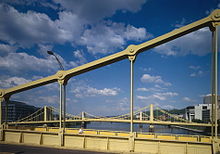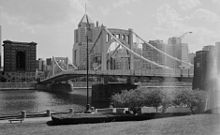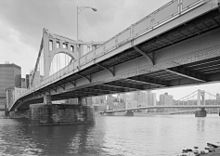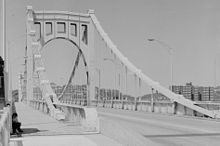Three Sisters (Pittsburgh)
| The Three Sisters | |
|---|---|

View of Sixth, Seventh and Ninth Street Bridges from downriver
|
|
| Coordinates | 40°26′39″N 80°00′04″W / 40.444269°N 80.000982°WCoordinates: 40°26′39″N 80°00′04″W / 40.444269°N 80.000982°W |
| Carries | 2 Vehicular lanes, 2 sidewalks |
| Crosses | Allegheny River |
| Locale | Pittsburgh, Pennsylvania |
| Maintained by | Allegheny County |
| Characteristics | |
| Design | Self-anchored suspension bridge |
| Designated | 1988 |
| Sixth Street Bridge | |
|---|---|

From north bank of the Allegheny, downtown Pittsburgh in background
|
|
| Carries | Sixth Street |
| Official name | Roberto Clemente Bridge |
| Characteristics | |
| Total length | 884 feet (269 m) in main plus two 215 feet (66 m) side spans; 995 feet (303 m) with approaches |
| Width | 38 feet (12 m) roadway (formerly 2 vehicle, 2 tramway tracks, now 2 wide vehicle lanes) with 10 feet (3.0 m) sidewalks outside the plate girders |
| Longest span | 430 feet (130 m) |
| Clearance above | 78 feet (24 m) towers |
| Clearance below | deck is 40 feet (12 m) above Emsworth Dam normal pool level or 710 feet (220 m) above sea level |
| History | |
| Opened | October 19, 1928 |
| Seventh Street Bridge | |
|---|---|

From north bank of the Allegheny, looking SW, downtown Pittsburgh in background, Sixth Street Bridge at right. Shows main plate girder (bearing compressive forces) and sidewalk support
|
|
| Carries | Seventh Street |
| Official name | Andy Warhol Bridge |
| Characteristics | |
| Total length | 884 feet (269 m) in main plus two 221 feet (67 m) side spans; 1,061 feet (323 m) with approaches |
| Width | 38 ft roadway (formerly 2 vehicle, 2 tramway tracks, now 2 wide vehicle lanes) with 10 feet (3.0 m) sidewalks outside the plate girders; total 62 feet (19 m) |
| Longest span | 442 feet (135 m) |
| Clearance above | 83.5 feet (25.5 m) towers |
| Clearance below | deck is 40.1 feet (12.2 m) above Emsworth Dam normal pool level or 710 feet (220 m) above sea level |
| History | |
| Opened | June 17, 1926 |
| Ninth Street Bridge | |
|---|---|

From south bank of the Allegheny, looking NE, oblique view of roadway and south tower, showing eyebar links for main suspenders and roadway suspenders, as well as main compressive stiffening girders dividing roadway from sidewalks
|
|
| Carries | Ninth Street |
| Official name | Rachel Carson Bridge |
| Characteristics | |
| Total length | 840 feet (260 m) in main plus two 215 feet (66 m) side spans; 995 feet (303 m) with approaches |
| Width | 38 feet (12 m) roadway (formerly 2 vehicle, 2 tramway tracks, now 2 wide vehicle lanes) with 10 feet (3.0 m) sidewalks (outside the plate girders; total 62 feet (19 m) |
| Longest span | 410 feet (120 m) |
| Clearance above | above 78 feet (24 m) towers |
| Clearance below | deck is 40.3 feet (12.3 m) above Emsworth Dam normal pool level or 710 feet (220 m) above sea level |
| History | |
| Opened | 26 November 1926 |
The Three Sisters are three very similar self-anchored suspension bridges spanning the Allegheny River in downtown Pittsburgh, Pennsylvania at 6th, 7th, and 9th streets, generally running north/south. The bridges have been given formal names to honor important Pittsburgh residents:
Designed by the Allegheny County Department of Public Works, they were all built in a four-year period, from 1924 to 1928, by the American Bridge Company, replacing earlier bridges of various designs at the same sites. Their construction was mandated by the War Department, citing navigable river clearance concerns. They are constructed of steel, and use steel eyebars in lieu of cables.
The Three Sisters are historically significant because they are the only trio of nearly identical bridges, as well as the first self-anchored suspension spans, built in the United States. They are among the only surviving examples of large eyebar chain suspension bridges in America, and furthermore, unusual for having been erected using cantilever methods. The bridges’ design was viewed as a creative response to the political, commercial, and aesthetic concerns of Pittsburgh in the 1920s.
The bridges were designed under the auspices of the Allegheny County Department of Public Works, by T. J. Wilkerson, consulting engineer; Vernon R. Covell, chief engineer; A. D. Nutter, design engineer; and Stanley L. Roush, architect. The American Bridge Company built the superstructure; while the Foundation Company built the substructure. All three bridges are owned by Allegheny County.
Like New York City residents, Pittsburghers are quite enamored of suspension bridges in general and some of the country's earliest and finest examples can be found in the southwestern Pennsylvania area. From 1926 through 1931, four suspension bridges were constructed across the Allegheny and Monongahela Rivers. The fourth bridge (not covered in this article) is a wire cable bridge carrying South Tenth Street across the Monongahela.
...
Wikipedia
